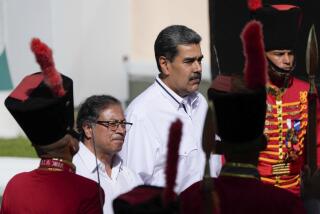Mediators Side With Opposition in Serbia
- Share via
BELGRADE, Yugoslavia — International mediators on Friday handed a moral triumph to the Serbian opposition, backing its claims of victory in elections annulled by President Slobodan Milosevic, even as heavily armed police for the second day corralled and beat dozens of anti-government protesters.
Tens of thousands of demonstrators sandwiched between cordons of police in a downtown plaza cheered and danced at news that the delegation probing election fraud sided with the president’s enemies and confirmed their victories in key municipal races.
Former Spanish Prime Minister Felipe Gonzalez, heading a delegation of the Organization for Security and Cooperation in Europe, or OSCE, urged Milosevic to honor Nov. 17 election results that he annulled in a move that triggered the most persistent wave of civil unrest seen in Serbia in decades.
Milosevic, who is increasingly isolated, was likely to dismiss the OSCE verdict--even though he invited the delegation to Belgrade in the first place.
He was informed of the findings by Gonzalez in a telephone conference call Friday afternoon, and he was reported to have reacted angrily. He then had Milan Milutinovic, his foreign minister, telephone Gonzalez to request that the findings be kept secret, according to Western sources.
Gonzalez refused, and the report was made public at a news conference in Geneva.
Milosevic has until Monday to respond formally, and the OSCE will meet in emergency session on Jan. 3 to decide its next move.
Although the opposition can relish the psychological boost in its fight for democracy, in reality, the OSCE has no means of enforcing its recommendations.
Even before the OSCE findings were released, Milosevic worked to undercut them.
Several senior government officials during the last week insisted that the results of the probe are not binding and that elections are purely an internal affair.
Organizers of the daily street demonstrations bedeviling Milosevic announced the Gonzalez decision on megaphones to yet another massive crowd that gathered in central Belgrade in defiance of a police ban.
“Will Milosevic be honorable enough to accept the results of the commission he invited?” Zoran Djindjic, one of three leaders of the opposition coalition known as Zajedno, or Together, asked the crowd. “Or will he label the commission an enemy of the nation? . . . We do not expect him to respect the findings of this commission. We expect further escalation and aggravation of this political crisis.”
For the last two days, Milosevic has clamped down ever more tightly on the demonstrations. Row after row of helmeted, shield-carrying police Friday surrounded students and stopped their march, confining them instead to a pedestrian walkway. Many paraded in a circle with their hands behind their heads, like prisoners.
Police pushed other demonstrators out of city streets, trapping them in a single downtown square. There, the rally went ahead, but--except for the OSCE findings celebration--the crowd seemed more subdued than in previous days.
People seemed more nervous, clearly watching the massive police presence that appeared ready to pounce at any moment.
“I am your mother!” one woman clad in a fur coat screamed at the police charging down the street in front of Zajedno headquarters.
For the second day, police clubbed groups of demonstrators to drive them from the streets.
At least 30 people were injured, including two student leaders, a union president, journalists and a 12-year-old girl, witnesses and radio reported.
In a potentially ominous development for the protesters, some of those who conducted beatings alongside uniformed police were young men in civilian dress--either plainclothes police or thugs operating with tacit government approval.
Several people were also arrested.
In Washington, the Clinton administration applauded the OSCE report and called on Milosevic to heed it.
Gonzalez’s “conclusions match our own,” State Department spokesman John Dinger said. “We believe that the best way possible to resolve this situation is for President Milosevic to now heed the delegation’s recommendations.”
At the same time, Dinger warned that Milosevic, by trying to put down anti-regime demonstrations, “inevitably raises tensions and increases the possibility of confrontation and violence.”
Serbia, he said, “must honor [its] international commitments and move toward democracy before it can be accepted fully into the international community.”
Gonzalez, whose OSCE fact-finding mission spent one day in Belgrade last week, called for an “urgent appeal” to authorities and political forces in Yugoslavia--a rump federation that now comprises tiny Montenegro and Serbia--to “comply with the will expressed at the polls by the citizens” of the republic.
The Gonzalez delegation, which included nine other foreign members, found that Zajedno had victories in 13 cities and nine districts of Belgrade, all of which were annulled by Milosevic-controlled courts.
Gonzalez told the Geneva news conference that the reasons given by the courts for annulling the results were based on arguments “that no democratic country could have accepted.”
State television, which is controlled by Milosevic and is the major source of information for the vast majority of Serbia, limited its report Friday night of the OSCE verdict to the elements favorable to the regime--that the leftist coalition surrounding Milosevic won the highest number of votes overall and that dialogue “within the framework of the system” was urged.
The regime likes to emphasize work “within the system” because all institutions of the system are controlled by Milosevic or his allies.
Milutinovic, interviewed on state television, described the OSCE report as “constructive and well-balanced,” but he added that Gonzalez “got some things mixed up.”
Yugoslavia’s membership in the OSCE was suspended in 1992 as punishment for its role in fomenting war in neighboring Bosnia-Herzegovina. But officials of the Milosevic government have repeatedly expressed their desire to regain full membership status.
Times staff writer Norman Kempster in Washington contributed to this report.
More to Read
Sign up for Essential California
The most important California stories and recommendations in your inbox every morning.
You may occasionally receive promotional content from the Los Angeles Times.














